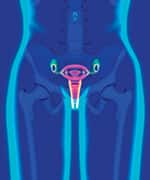Life Extension Magazine.
Most people take probiotics to improve immune and digestive function.
But the intestines are not the only place where healthy bacterial flora are important.
Another site unique to women is the vagina. Healthy vaginal flora can support gynecological health.1,2
An unhealthy mix can increase risk for bacterial, yeast, and sexually transmitted infections, along with fertility problems.1
Researchers have identified a specific type of Lactobacillus bacteria that has been shown to improve the vaginal microbiome while reducing colonization by potentially harmful microorganisms.3-5
The Importance of Vaginal Health
The predominant bacteria species present in a healthy vaginal microbiome are those in the Lactobacillus genus.2
When numbers of Lactobacillus drop, it makes room for potentially harmful microorganisms to gain a foothold. Unhealthy yeast like Candida albicans and bacteria such as Gardnerella vaginalis can grow in numbers.2
This shift toward harmful microorganisms in the vagina is referred to as vaginal dysbiosis. If it gets severe enough, it can lead to common infections like bacterial vaginosis or a yeast infection.2
It is estimated that as many as 29% of U.S. women aged 14 to 49 have a vaginal microbiome consistent with bacterial vaginosis,1 which can cause burning during urination, strong "fishy" vaginal odor, vaginal itching, and abnormal vaginal discharge.6
Recurrent vaginal yeast infections (vulvovaginal candidiasis) are also increasingly common, affecting approximately 138 million women annually worldwide.7
They are associated with increased risk of infections, inflammation, and negative reproductive outcomes.1,7
Maintain a Healthy Vaginal Microbiome
Scientists have isolated a specific strain of the probiotic bacteria Lactobacillus plantarum that is prevalent in a healthy vaginal microbiome.
This strain has been shown to interfere with the growth of pathogens like Candida yeast by outcompeting them for the ability to attach and thrive.8
A study was conducted using vaginal epithelial cells that already contained undesirable microorganisms such as C. albicans, G. vaginalis, Staphylococcus aureus, and Escherichia coli.
L. plantarum was shown to successfully adhere to and help protect these infected cells.9
L. plantarum has also been evaluated in several human trials, with impressive results:3,5,10
- Oral intake resulted in L. plantarum colonization of the vagina and an improvement in the vaginal microbiome.
- Lactobacillary grade scores, used to clinically evaluate vaginal microbiome healthy lactobacillus levels, improved significantly.
- In women with vaginal dysbiosis and a history of recurrent yeast infections, there was a significant reduction in redness and swelling.
Gastrointestinal and Immune Function
Probiotics have also been found to help address gastrointestinal issues and general immune function.
Gastrointestinal symptoms such as abdominal cramps, diarrhea, constipation, nausea, and vomiting are frequently reported around the time of menstruation.11 Irritable bowel syndrome (IBS) is also characterized by symptoms of diarrhea, constipation, and abdominal pain, and is more common in women than men.12
Another specific Lactobacillus strain, L. helveticus, may help address these issues. It supports immune health and a healthy inflammatory response. In preclinical studies, this probiotic:
- Inhibits the growth of common pathogens such as Listeria, Candida, and E. coli,13-15
- Reduces production of pro-inflammatory mediators, including those associated with chronic inflammation and risk for autoimmune disease and cancer in the gut,16-19
- Increases production of interferon and cells that produce IgA antibodies, which both help the immune system fight infections,17 and
- Reduces intestinal inflammation in animals while reducing markers of systemic inflammation and oxidative stress.18
In a study of adults,20 a majority of subjects believed that this probiotic had a beneficial effect on their health, with a significant improvement in average scores of gastrointestinal symptoms including diarrhea, constipation, crampy abdominal pains, and flatulence.
In other studies, L. helveticus demonstrated an ability to improve immune function, both in normal subjects and in elite, fatigued athletes whose immune function can dwindle with intense training.21-23
These studies found that this strain boosts components of immune function that are associated with protection from infectious diseases, including increasing secretion of interferon and maintenance of salivary IgA antibody levels.
What you need to know
A Probiotic Blend Designed for Women
- Like the gut, the health of the vagina is dependent on the balance of various types of microorganisms living there. Healthy bacteria protect vaginal health, while pathogens increase risk for vaginal infections and other disorders.
- Oral intake of the probiotic L. plantarum has been shown to reach the vaginal environment where it helps outcompete and impair the growth of pathogenic microorganisms, improving vaginal health.
- Another probiotic, L. helveticus, improves gut health, reducing common gastrointestinal symptoms, and boosts immune function and resistance to infection.
- Scientists have formulated a probiotic blend of these strains of Lactobacillus bacteria, which can help women improve their overall health including vaginal, gastrointestinal, and immune health.
In one study, use of the probiotic L. helveticus led to a significant reduction in the duration andseverity of upper respiratory tract infections.22
Taking L. helveticus along with L. plantarum can support overall optimum women’s health.
Summary
A healthy vaginal flora can support vaginal health. An unhealthy mix can increase risk for bacterial infections, yeast infections, sexually transmitted infections, and even fertility problems.
The probiotic Lactobacillus plantarum helps ensure a healthy composition of vaginal microbiome able to outcompete potential harmful microorganisms that can cause bacterial or yeast infections.
Another probiotic, Lactobacillus helveticus, has been shown to improve common gastrointestinal symptoms like cramps, diarrhea, and constipation along with markers of immune function.
The combination of these probiotics provides a wide range of benefits for optimal women’s health.
If you have any questions on the scientific content of this article, please call a Life Extension Wellness Specialist at 1-866-864-3027.
References
- Kroon SJ, Ravel J, Huston WM. Cervicovaginal microbiota, women’s health, and reproductive outcomes. Fertil Steril. 2018 Aug;110(3):327-36.
- Tachedjian G, Aldunate M, Bradshaw CS, et al. The role of lactic acid production by probiotic Lactobacillus species in vaginal health. Res Microbiol. 2017 Nov - Dec;168(9-10):782-92.
- Vladareanu R, Mihu D, Mitran M, et al. New evidence on oral L. plantarum P17630 product in women with history of recurrent vulvovaginal candidiasis (RVVC): a randomized double-blind placebo-controlled study. Eur Rev Med Pharmacol Sci. 2018 Jan;22(1):262-7.
- Montella R. Vaginal adhesion of Lactobacillus plantarum P17630 after probiotic food supplement oral administration: a preliminary in vivo study. Nutrafoods. 2013;12:35-42.
- Lallemand Internal Reports. 2014.
- Available at: https://www.mayoclinic.org/diseases-conditions/bacterial-vaginosis/symptoms-causes/syc-20352279. Accessed May 27, 2022.
- Denning DW, Kneale M, Sobel JD, et al. Global burden of recurrent vulvovaginal candidiasis: a systematic review. Lancet Infect Dis. 2018 Nov;18(11):e339-e47.
- Culici M. Adhesion of Lactobacillus plantarum P 17630 to vaginal epithelial cells and its influence on Candida albicans adhesion. GIMMOC. 2004;VIII(1):34-41.
- Bonetti A, Morelli L, Campominosi E, et al. Adherence of Lactobacillus plantarum P 17630 in soft-gel capsule formulation versus Doderlein’s bacillus in tablet formulation to vaginal epithelial cells. Minerva Ginecol. 2003 Jun;55(3):279-84, 84-7.
- Montella R, Malfa P, Giuliano A, et al. Vaginal adhesion of Lactobacillus plantarum P17630 after probiotic food supplement oral administration: a preliminary in vivo study. Nutrafoods. 2013;12(2):35-42.
- Bernstein MT, Graff LA, Avery L, et al. Gastrointestinal symptoms before and during menses in healthy women. BMC Womens Health. 2014 Jan 22;14:14.
- Lovell RM, Ford AC. Effect of gender on prevalence of irritable bowel syndrome in the community: systematic review and meta-analysis. Am J Gastroenterol. 2012 Jul;107(7):991-1000.
- Elahi S, Pang G, Ashman R, et al. Enhanced clearance of Candida albicans from the oral cavities of mice following oral administration of Lactobacillus acidophilus. Clin Exp Immunol. 2005 Jul;141(1):29-36.
- Johnson-Henry KC, Hagen KE, Gordonpour M, et al. Surface-layer protein extracts from Lactobacillus helveticus inhibit enterohaemorrhagic Escherichia coli O157:H7 adhesion to epithelial cells. Cell Microbiol. 2007 Feb;9(2):356-67.
- Mahoney M, Henriksson A. The effect of processed meat and meat starter cultures on gastrointestinal colonization and virulence of Listeria monocytogenes in mice. Int J Food Microbiol. 2003 Aug 1;84(3):255-61.
- Neurath MF. IL-23 in inflammatory bowel diseases and colon cancer. Cytokine Growth Factor Rev. 2019 Feb;45:1-8.
- Paturi G, Phillips M, Jones M, et al. Immune enhancing effects of Lactobacillus acidophilus LAFTI L10 and Lactobacillus paracasei LAFTI L26 in mice. Int J Food Microbiol. 2007 Apr 1;115(1):115-8.
- Peran L, Camuesco D, Comalada M, et al. A comparative study of the preventative effects exerted by three probiotics, Bifidobacterium lactis, Lactobacillus casei and Lactobacillus acidophilus, in the TNBS model of rat colitis. J Appl Microbiol. 2007 Oct;103(4):836-44.
- van Baarlen P, Troost F, van der Meer C, et al. Human mucosal in vivo transcriptome responses to three lactobacilli indicate how probiotics may modulate human cellular pathways. Proc Natl Acad Sci U S A. 2011 Mar 15;108 Suppl 1:4562-9.
- Welin A. Survival of L. acidophilus and L. casei in the Human GI Tract. Perceived Effects on Health. Nutrafoods. 2005 4:(2/3);9-14.
- Clancy RL, Gleeson M, Cox A, et al. Reversal in fatigued athletes of a defect in interferon gamma secretion after administration of Lactobacillus acidophilus. Br J Sports Med. 2006 Apr;40(4):351-4.
- Marinkovic DM. Lactobacillus helveticus Lafti® L10 supplementation reduces respiratory infection duration in a cohort of elite athletes: a randomized double-blind placebo-controlled trial. Applied Physiology, Nutrition, and Metabolism. 2016.
- Michalickova DM. Lactobacillus helveticus LAFTI® L10 Supplementation Modulates Mucosal and Humoral Immunity in Elite Athletes. Journal of Strength and Conditioning Research 2017;31(1):62-70.







